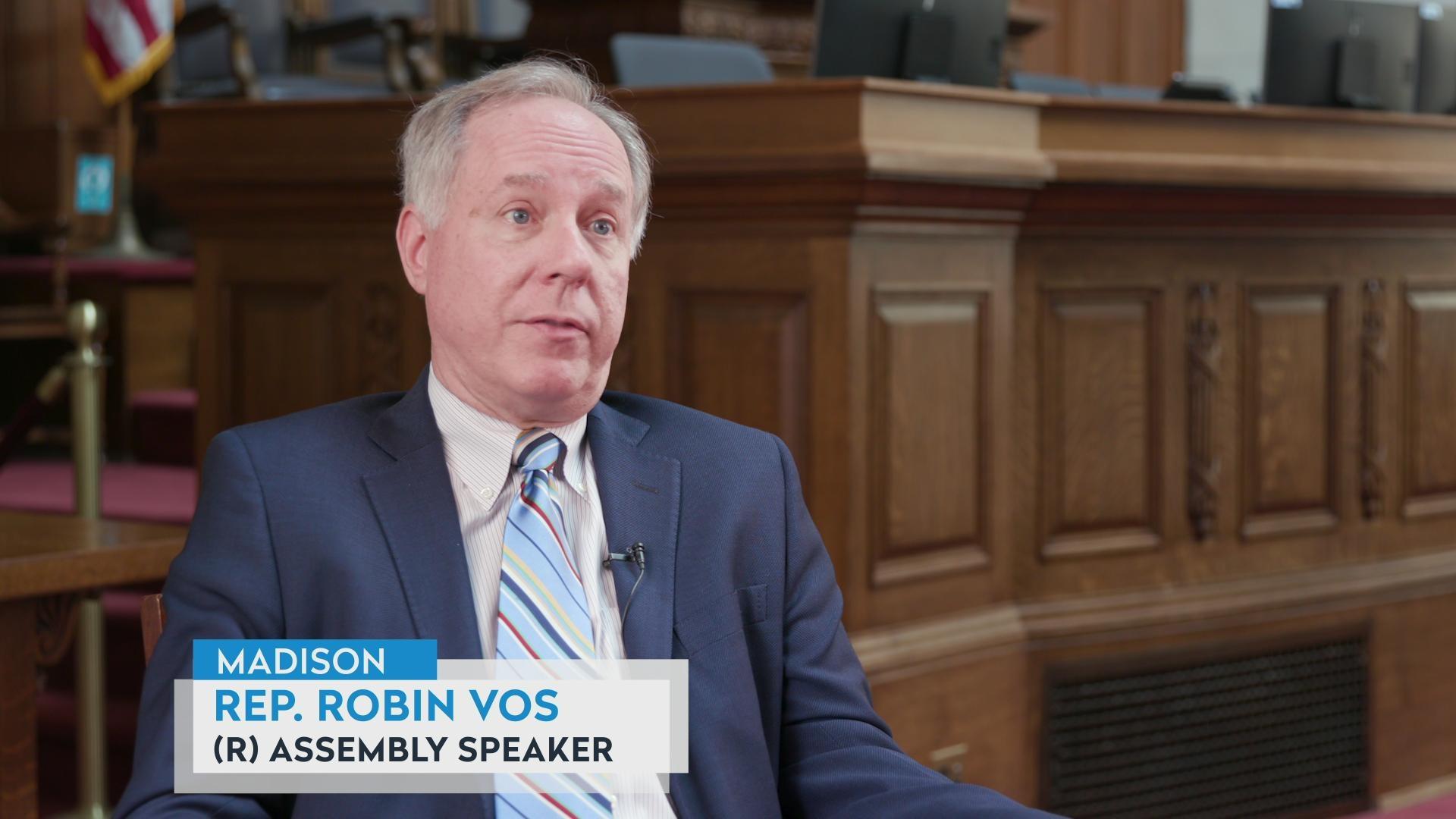Frederica Freyberg:
Down ballot from the presidential race, Republicans and Democrats in the Legislature were able to flip some seats, but the end result is the same. Republicans will retain commanding majorities in the state Legislature heading into next year. But not large enough where they could override Governor Tony Evers’ veto power. Barring any recounts, Senate Republicans won two seats held by Democrats giving them a 21-12 majority. Assembly Democrats won two Republican seats in the Milwaukee suburbs, but Republicans control the chamber 61-38. Additionally, because Scott Fitzgerald won a seat in the U.S. House, the state Senate this week elected Senator Devin LeMahieu as its new majority leader. For more on what this means for next year, we sat down with “Here & Now” Senior Political Reporter Zac Schultz.
Hey Zac, thank you for doing this.
Zac Schultz:
My pleasure, Fred.
Frederica Freyberg:
So Governor Evers holds on to his mighty veto pen. In fact, Democrats ran on a slogan of “Save the Veto” to stave off a veto-proof supermajority. What are the implications of Evers maintaining his veto power?
Zac Schultz:
Well, that “Save the Veto” message was directed at one item only and that was redistricting. The biggest battle going forward is going to be how the next set of maps are drawn that divide up our Congressional districts, state Senate and Assembly seats. Ten years ago, Republicans had complete control over that process and they created maps that put them in power for the rest of the decade. And Democrats were afraid that was going to happen again if Governor Evers didn’t have the ability to veto those maps and hope for a different resolution and force some compromise.
Frederica Freyberg:
So what happens then when the Republicans fashion their own maps and the governor decides he doesn’t like that and he vetoes it? Then what?
Zac Schultz:
Well, if that is the way it plays out. There’s also a chance of compromise. Let’s not put that completely out of the question but in the most likely scenario Republicans draw their maps. The governor vetoes them. Then it will go to the courts most likely. Now in past decades that has been a federal judge who has been drawing those maps that everyone had to live under for ten years. In this case, Republicans would like to see that be the State Supreme Court because they think they have an advantage with the conservatives there. Either the conservatives there drawing the maps or perhaps favoring maps already drawn by Republicans in the Legislature.
Frederica Freyberg:
That adds up. What does it mean to have a new majority leader in the Senate?
Zac Schultz:
Well, they’ll have their work cut out for them. Senate Majority Leader Scott Fitzgerald had a reputation for really knowing how his caucus worked, where his members were. He’s got some extremely conservative members who have been in the Assembly and the state Senate for a long time, very strong individuals that aren’t going to be moved by party politics and pressure from anyone else. This new majority leader will have to step in and figure out how to negotiate an expanded roster. One of the things that they’ll have to deal with is some of those very same conservatives have been calling for the Legislature to come back in and strike down Governor Evers’ mask mandate and some of this other health emergency orders regarding how we’re responding to the COVID pandemic. Before the election, Republican leadership held off on that. They were afraid of what that might mean at the ballot box if they were seen striking down what were quite popular public official positions on mask mandates. That may change going forward and it could change as soon as next week if the Legislature comes in. The Senate could come in and strike it down and it would require the Assembly to do so as well. But those are some of the differences we may see right off the bat.
Frederica Freyberg:
All right. Meanwhile, even now the relationship between the Republican Legislature and the executive branch could be described as icy at the very best. There are big and serious issues before the state as we’ve discussed: COVID response and then the state budget. Is post-election time as we’ve discussed the time for the branches to come together and work on any COVID response?
Zac Schultz:
It could be. It depends on what happens at the Presidential and U.S. Senate level. If they decide at the national level to create another COVID relief package, then it’s likely the Legislature in Wisconsin will wait to see what that looks like and if it includes any relief for the states or the cities in Wisconsin as those first few packages in the spring did. If nothing happens at the federal level, then it may require the state to come back in. But that will be a waiting game. I wouldn’t anticipate them doing that right away, especially since we’re getting close to the next session and the next budget.
Frederica Freyberg:
Speaking of the budget, how tough is this budget year going to be given the state of the economy right now and the continuing effects of the pandemic?
Zac Schultz:
Well, it’s not going to be pretty at the moment. But a big question is how quickly does the economy in the state and nationally rebound if we ever get a hold on this COVID pandemic. Obviously right now we don’t have control over it at all. And that’s directly affecting sales tax revenue, income tax revenues, all those things that help fund state government. Going forward, this budget won’t go into effect until next July, but they’ll be negotiating in the spring. So how they see the COVID response then versus what it will look like for the following two years will determine how comfortable they are to put money into these programs and what kind of budget they actually pass.
Frederica Freyberg:
Yeah. Back to the election, the presidential election. Having reported on so many angles of it over these months, how does this one compare to all those you have covered over the years?
Zac Schultz:
I don’t think there’s any comparison to any election, presidential election we’ve had in Wisconsin. The Democrats in Wisconsin basically sat out in-person campaigning and holding rallies while Republicans went forward with all of that. So I guess you could say Republicans had a traditional election while Democrats did not. In past years, we’ve seen Barack Obama and John Kerry come to Madison or Milwaukee and hold these massive rallies if for nothing else than the images to send around the nation showing democratic enthusiasm and energy. That wasn’t possible for Joe Biden to do. The three times he came, they were all socially distanced. There were only a handful of people. There were no crowds. Just didn’t have the same look or effect. It was completely different election to try and cover what was happening on the ground when we had to worry about how to even interact with the candidates, how to interact with voters, how were voters responding. Completely different era regarding absentee ballots and how that worked out. We’ll probably never see anything quite like this when it comes to being in the pandemic or at least we hope so.
Frederica Freyberg:
All right. Zac, thank you for all the work you did do during this election. Talk to you later.
Zac Schultz:
Thanks, Fred.
Search Episodes
News Stories from PBS Wisconsin

Donate to sign up. Activate and sign in to Passport. It's that easy to help PBS Wisconsin serve your community through media that educates, inspires, and entertains.
Make your membership gift today
Only for new users: Activate Passport using your code or email address
Already a member?
Look up my account
Need some help? Go to FAQ or visit PBS Passport Help
Need help accessing PBS Wisconsin anywhere?

Online Access | Platform & Device Access | Cable or Satellite Access | Over-The-Air Access
Visit Access Guide
Need help accessing PBS Wisconsin anywhere?

Visit Our
Live TV Access Guide
Online AccessPlatform & Device Access
Cable or Satellite Access
Over-The-Air Access
Visit Access Guide
 Passport
Passport


















Follow Us